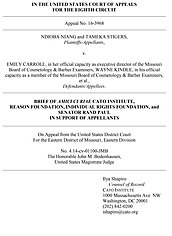Niang v. Carroll
Learn more about Cato’s Amicus Briefs Program.
Becoming an EMT in Missouri requires 144 hours of training, including instruction in CPR, trauma care, handling hazardous materials, and medical ethics. But Ndioba “Joba” Niang and Tameka Stigers don’t want to be EMTs. They both want to run salons offering traditional African-style hair braiding. Braiding hair, however, requires at minimum 1000 hours of training, 90 percent of which isn’t even generally relevant to African-style hair braiding. That’s because the Missouri Board of Cosmetology and Barber Examiners (an administrative board made up primarily of practicing barbers and cosmetologists, as well as the owners of in-state cosmetology/barbering schools) has declared that anyone wanting to braid hair professionally must be a licensed cosmetologist or barber—despite the fact that neither licensing program offers any training whatsoever in the services Niang and Stigers intend to offer. Defended as necessary to protect Missouri’s consumers from the health, safety, and fraud risks caused by untrained hair braiders, this licensing regime is actually a thinly disguised cartel in which insiders have built up arbitrary and expensive licensing requirements in an effort to limit competition. It is for this reason that Niang and Stigers, with the assistance of the good people at the Institute for Justice, have filed suit challenging Missouri’s licensing regime as a violation of the Fourteenth Amendment’s Due Process and Equal Protection clauses. A federal district court upheld the licensing regime, using an extremely deferential form of judicial review that requires judges to blindly accept the government’s justifications of its actions, and even supply their own if they don’t find the government’s compelling enough. Under that form of review, as long as there is any potentially conceivable “rational basis” for the law, courts will not strike it down. Cato, joined by the Reason Foundation, Individual Rights Foundation, and Senator Rand Paul (R‑KY), has filed an amicus brief urging the U.S. Court of Appeals for the Eighth Circuit to reverse the district court and reject its rubber-stamp approach to the core judicial function of keeping the other two branches in check. The district court’s application of the rational basis test undermines the constitutional guarantee of procedural due process by denying plaintiffs both the right to a meaningful opportunity to be heard and to have their case judged by an impartial tribunal. Deprivations of economic liberty require meaningful judicial scrutiny that actively engages with the facts of the case without putting a finger on the scales in favor of the government. As the Supreme Court has held in other contexts, meaningful scrutiny is especially important in situations like this one, where there are strong indications that the government’s proffered justifications are just pretextual smokescreens for illegitimate anti-competitive cartel behavior—and when the victims of the regulations lack sufficient numbers and resources to overcome the cartel through political means. The Eighth Circuit should reverse the lower court because Missouri’s licensing scheme for traditional African hair braiders isn’t rationally related to any legitimate governmental purpose.

This work is licensed under a Creative Commons Attribution-NonCommercial-ShareAlike 4.0 International License.


